Lisa Weitzman, LISW-S, is the BRI Care Consultation™ Manager of Business Development at Benjamin Rose Institute on Aging
Take care of yourself so that you can better care for your loved one. It’s great advice for any caregiver to follow, but often the first thing to reach for is a bag of tortilla chips or a hot fudge sundae. Turning to junk food for comfort is a natural response to being bombarded with ads designed to convince us that our favorite desserts and snacks are a ticket to emotional well-being. While succumbing to cravings for unhealthy foods can work briefly to block out hard-to-handle feelings that can go along with caregiving, experts on self-care warn against “emotional eating,” or using food to suppress or soothe painful emotions.
According to Registered Dietician Ellyn Satter, “Eating can raise your spirits when you are low, soothe you when you are tense, and distract you when you are upset.” These behaviors become an issue, though, when “feelings go straight to eating, with no interpretation,” such as when you pay no attention to what you are consuming when you eat and ultimately feel out of control.
Because of the stresses involved, caregivers are at risk for emotional eating. When your body undergoes stress, studies show, it produces a high level of cortisol, which then triggers cravings for salty and sweet foods to bring about a quick rush of energy and pleasure. An additional trap is that after spending hours focused on caregiving, you may feel justified in indulging in extra desserts or snacks when evening rolls around. A sense of emptiness that comes with exhaustion can also masquerade as hunger. As a result, you may turn to food to numb pain. The rub is that your original emotions don’t go away, and when combined with the guilt or shame you may feel from eating junk food, they may add to your emotional burden.
Emotional eating is more than simply eating as a celebration or reward for a personal or professional accomplishment; it is relying on food as a primary means of coping with uncomfortable feelings. In contrast to physical hunger, which arises gradually over time, emotional hunger comes on suddenly, almost like an uncontrollable urge. When you are physically hungry, you tend to think about the food you eat and can be satisfied with a well-balanced meal; when you are emotionally hungry, you crave foods that give you an instant boost. And because they are not responding to actual hunger, emotional eaters may binge eat without feeling a need to stop.
Even though it can take effort to transform your eating habits, you can follow these steps to see to it that your eating satisfies biological rather than emotional needs:
- Clear out your cupboards and refrigerator and fill them with healthy options
- Develop emotional awareness: think about what feelings trigger your eating patterns —stress, anger, boredom, fear, sadness, loneliness—and then create a plan to confront these feelings directly
- Allow yourself to eat when you are physically hungry, and enjoy what you eat to fill that need
- Try meditation: you can do simple deep breathing almost any place, and it is a more positive form of stress relief
- Seek connection with other people, rather than with food. As licensed therapist and emotional eating specialist Tracie Strucker states, “emotional eating can’t help you connect in the way you want and need to connect with others or yourself.”
- Pat yourself on the back: remind yourself often of all of the positive headway you are making
If you feel you need additional assistance or support to manage your emotional eating, you may wish to speak with a licensed counselor or therapist. You may also find additional guidance and referrals by contacting:
- The Emotional Eating Organization: www.emotionaleating.org or (718) 788-6986
- National Eating Disorders Association: www.nationaleatingdisorders.org or (800) 931-2237






